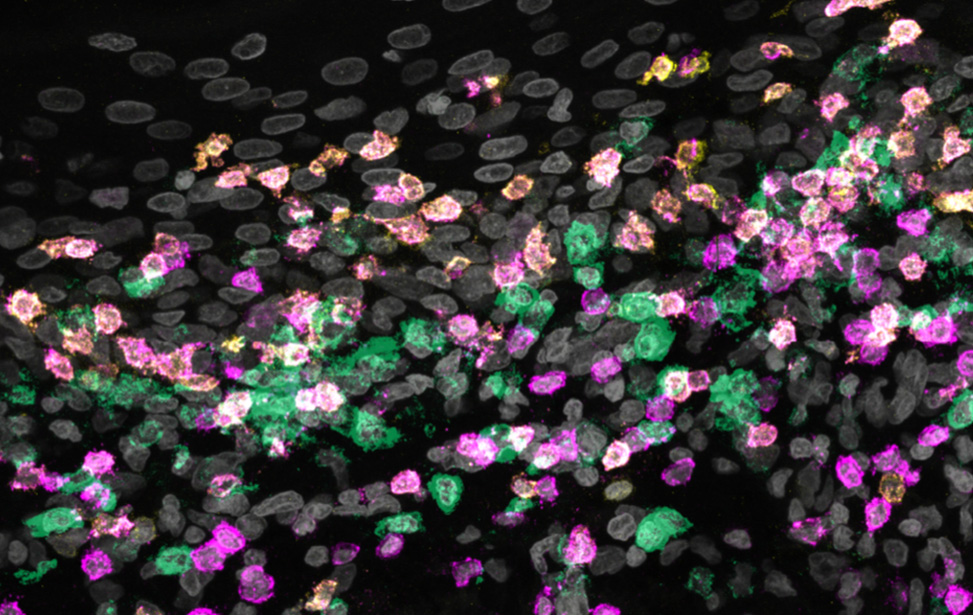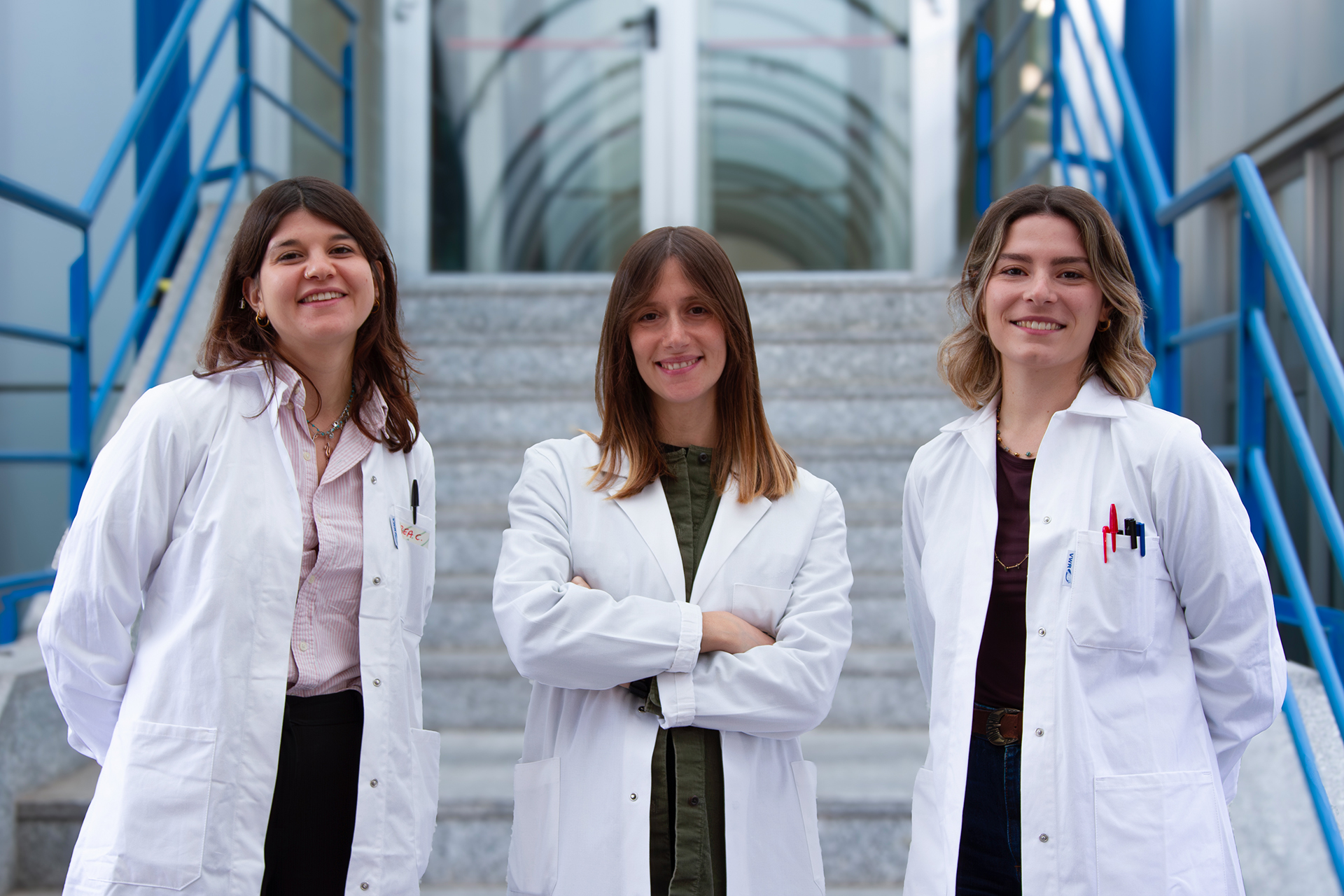Beatrice Zitti Lab

Beatrice Zitti
Beatrice received her Master in Medical Biotechnology at Sapienza University in Rome in 2013. She performed her undergraduate research in the laboratory of Molecular Immunology and Immunopathology directed by Prof. Angela Santoni and under the supervision of Prof. Rossella Paolini.Beatrice pursued her doctoral studies and obtained her PhD in Life Science in 2017 from Sapienza University. Her work investigated the modulation of innate cytotoxic lymphocyte (NK cells) functions during tumor immune surveillance. Particularly, the findings demonstrating that post-translational modifications impair NK cell-mediated tumor recognition and killing, contributed to our understanding of mechanisms employed by cancer cells to escape the immune system.
Read moreContact the researcher

Tumor Microenvironment and Immunotherapy
A tumor doesn’t grow in isolation; it is surrounded by a supportive network of stromal cells, blood vessels and immune cells, forming an ecosystem known as the tumor microenvironment (TME). This environment plays a critical role in shaping cancer development and spreading, ultimately influencing clinical outcomes. Immunotherapy has transformed the therapeutic landscape of many tumors and can produce exceptional results. Yet, only a minority of patients respond, emphasizing the need to uncover the mechanisms behind treatment success and develop better strategies to activate the immune system.
Read morePrevious publications
Positioning and reversible suppression of CCR7+ DCs in perivascular tumor niches shape cancer immunity.
Zitti B, Duval F, Wirapati P, Hicham M, Xie Y, Oh J, Hoelzl J, Meiser, Varrone M, Peterson HM, Cianciaruso C, Bill R, Bayerl F, Bolli E, Goubet AG, Kiss M, McDowell S, Cheng P, Celestini D, Terzic J, Zwahlen T, Alouche N, Zouggari N, Tarussio D, Tissot S, Nunes-Hasler P, Mino-Kenudson M, Lanuti M, Faquin WC, Sadow P, Tille JC, Labidi-Galy SI, Hugues S, Petrova TV, Ludewig B, Quezada S, Luther S, Tempel TR, Ciriello G, Pai SI, Michielin O, Böttcher JP, Weissleder R, Pittet MJ.
Manuscript under revision.
CXCL9:SPP1 macrophage polarity identifies a network of cellular programs that control human cancers.
Bill R, Wirapati P, Messemaker M, Roh W, Zitti B, Duval F, Kiss M, Park JC, Saal TM, Hoelzl J, Tarussio D, Benedetti F, Tissot S, Varrone M, Ciriello G, McKee TA, Monnier Y, Mermod M, Blaum EM, Gushterova I, Gonye ALK, Hacohen N, Getz G, Mempel TR, Klein AM, Weissleder R, Faquin WC, Sadow P, Lin D, Pai SI, Sade-Feldman M, Pittet MJ.
Science. 2023;381(6657):515-524.
doi:10.1126/science.adg7846.
PMID: 37535729
Human skin-resident CD8+ T cells require RUNX2 and RUNX3 for induction of cytotoxicity and expression of the integrin CD49a.
Zitti B, Hoffer H, Zheng W, Pandey RV, Schlums H, Perinetti Casoni G, Fusi I, Nguyen L, Kärner J, Kokkinou E, Carrasco A, Gahm J, Ehrström M, Happaniemi S, Keita AV, Hedin CRH, Mjösberg J, Eidsmo L, Bryceson YT.
Immunity. 2023;56(1):1-18.
doi:10.1016/j.immuni.2023.05.007.
PMID: 37269830
Bcl11b sustains multipotency and restricts effector programs of intestinal-resident memory CD8+ T cells.
Helm EY, Zelenka T, Cismasiu VB, Islam S, Silvane L, Zitti B, Holmes TD, Drashansky T, Kwiatkowski AJ, Tao C, Dean J, Obermayer AN, Chen X, Keselowsky BG, Zhang W, Huo Z, Zhou L, Sheridan B, Conejo-Garcia JR, Shaw TI, Bryceson YT, Avram D.
Sci Immunol. 2023;8(82):eabn0484.
doi:10.1126/sciimmunol.abn0484.
PMID: 37115913
A skewed pool of resident T cells triggers psoriasis-associated tissue responses in never-lesional skin from patients with psoriasis.
Gallais Sérézal I, Hoffer E, Ignatov B, Martini E, Zitti B, Ehrström M, Eidsmo L.
J Allergy Clin Immunol. 2019;143(4):1444-1454.
doi:10.1016/j.jaci.2018.08.048.
PMID: 30268387
